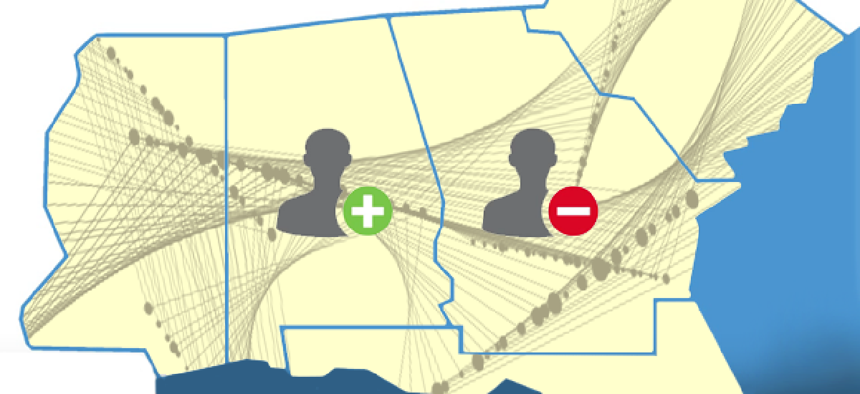5-state data clearinghouse cuts duplicate benefits payments

As people apply for assistance, the National Accuracy Clearinghouse flags duplicate identifying information from five states.
By sharing data on food and disaster assistance beneficiaries with four partner states, Mississippi is saving about $161,000 per month, or $1.932 million a year in duplicate payments. But the group isn’t keeping its success to itself. After all, the more states that participate, the more improper payments will be found, increasing the potential for savings.
The five states — Alabama, Florida, Georgia, Louisiana and Mississippi — saw the effects of benefits abuse and fraud after Hurricane Katrina struck the Gulf Coast in August 2005. In response, the states joined to create the National Accuracy Clearinghouse (NAC), a contributory system of beneficiary information that uses identity analytics and advanced linking technology to find duplicate benefit applications in near-real time.
“After Hurricane Katrina, there had been so many states involved in issuing food and disaster assistance, or [Disaster Supplemental Nutrition Assistance Program] D-SNAP, there was a lot of room for duplicate participation and/or fraud across those states,” said Joel Savell, project director of NAC. “The states were limited in how they could prevent that and ensure program integrity. It was pretty much a manual process due to the extent of the disaster.”
The states came up with an idea to address not only the problem of fraud in disaster assistance, but in the food stamp program overall. States administer that program, called SNAP, individually and without much collaboration, Savell added.
The result is NAC, to which participating states – for now, the original five – regularly submit their contributory data in an agreed-upon format. As people apply for assistance, NAC uses algorithms to find overlaps in identifying information, such as names, Social Security numbers and birth dates, across the states.
A person who applies for assistance in Florida, for example, but who already was receiving assistance in Mississippi, would be flagged when Florida processed the application. Florida officials would then notify those in Mississippi that the family had relocated and that address changes had been made to their account. That way, Savell said, people don’t receive duplicate benefits.
The states tapped IKnow and LexisNexis Risk Solutions to design, develop, implement, host and provide ongoing operational support for NAC. The companies used the Drupal content management system for user interfaces that let states create reports, track usage and search for dual participation, according to an IKnow project summary. They also used open source High Performance Computing Cluster Technology, known for its data-handling capabilities.
Information sharing happens in two ways: States can query NAC and get a real-time response, or they can submit requests through a batch or data file process each day and insert that information into their eligibility processes.
The information in NAC is updated automatically through a secure file interface transfer between the states and LexisNexis Risk Solutions. All of the information is stored in the LexisNexis Secure Data Cloud.
When NAC detects a potential duplication from an application in one state, it notifies the other.
“In Mississippi, we even have that automated for the ones that are a high-confidence match; the system automatically emails the other state to a centralized email box for NAC,” Savell said.
A pilot test of NAC ran from June 2014 to May. Last summer, the information from all five states was brought together, and since then NAC has been applied to each new SNAP and D-SNAP applicant at enrollment.
Alabama and Mississippi saw a 74 percent and 71 percent decrease, respectively, in the average number of dual participants per month after implementing NAC, according to the Public Consulting Group (PCG), which independently evaluated NAC. PCG also found that 72 percent of claims identified as dual participation were intentional program violations, while 25 percent were because of inadvertent client errors.
Following that success, the five states and PCG are finalizing plans for ways to bring other states on board. A report is due to USDA’s Food and Nutrition Service, which provided a grant for NAC’s development, by the end of August 2015. FNS will write its own report to submit to Congress at the end of November.
Tim Meeks, the NAC project lead, attributes the success not only to detecting and preventing more duplication, but also to the states’ willingness to collaborate.
“The states came together prior to the pilot – we call it the consortium – and created a common set of business rules,” Meeks said. “All the states were following the same set of rules specifically related to dual participation matches within the NAC process.”
The investment in NAC is minimal; states can use existing automation and secure file transfer and web services to implement it. New states must pay a setup fee, and all states pay an annual hosting fee that is based on the average household member count. In Mississippi, the hosting fee is $60,000 per year, but the system is identifying and preventing more than 300 dual participants, on average, each month putting monthly savings at $161,000, after the hosting fee, Savell said. States stand to earn a return on investment within a month of using NAC.
And as additional states sign on, the savings will grow. “We know we will have the potential for dual participation in just about every state in the nation,” Savell said. "So that is a very conservative number as far as savings is concerned because it only focuses on the other four states."
Whereas NAC is the product of a public-private collaboration, all states currently use the Public Assistance Reporting Information System, a federal/state partnership data-matching service that detects potential fraud. But the system’s process is labor intensive and misses warning signs, according to a whitepaper from LexisNexis. As a result, Meeks and Savell said they hope NAC sees wider adoption after Congress’ review.





